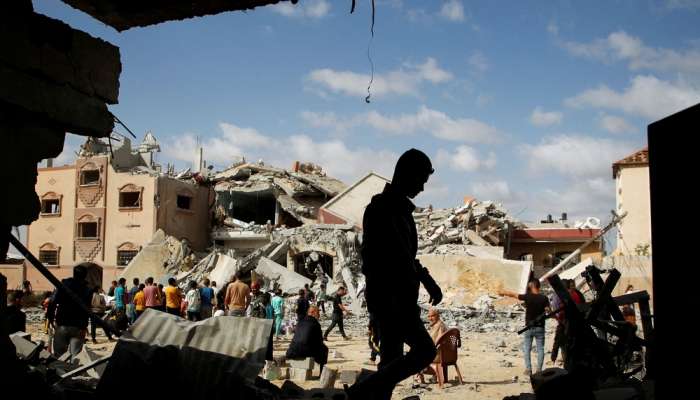Oman’s Foreign Minister, Sayyid Badr Hamad Al Busaidi, recently discussed a ceasefire proposal with Dr. Ismail Haniyeh, Head of Hamas Movement’s Political Bureau. During the phone call, Haniyeh expressed the movement’s acceptance of the proposal and the Palestinian side’s support for it in order to ease tensions, put an end to bloodshed, and halt mutual military operations. The proposal also includes provisions for the release of prisoners and detainees in stages, as well as other commitments such as lifting the siege on the Gaza Strip and allowing humanitarian aid to reach the population. Sayyid Badr welcomed the agreement and praised the efforts of Egypt, Qatar, and the US administration in facilitating the ceasefire proposal.
Dr. Ismail Haniyeh expressed gratitude for Oman’s support for the Palestinian cause and emphasized the importance of continuous communication, constructive dialogue, and international efforts to implement resolutions of international legitimacy. The ongoing conflict in the region has resulted in the displacement of many people and the suffering of the civilian population, making it crucial for all parties to come together and work towards peace. The ceasefire proposal represents a step in the right direction towards achieving stability and security in the region, while also addressing the humanitarian crisis in Gaza.
The ceasefire proposal not only aims to stop the violence and bloodshed, but also to address the root causes of the conflict and ensure the return of displaced people to their homes. The release of prisoners and detainees, along with the lifting of the siege on Gaza, are crucial steps towards rebuilding trust between the parties involved and creating a conducive environment for peace negotiations. By committing to these measures, both sides are showing a willingness to engage in meaningful dialogue and work towards a sustainable resolution of the conflict.
Sayyid Badr’s appreciation for the efforts of Egypt, Qatar, and the US administration highlights the importance of international cooperation in resolving the crisis in the region. The involvement of key stakeholders in facilitating the ceasefire proposal demonstrates a shared commitment to promoting peace and stability in the region. By working together towards a common goal, the international community can help create the conditions necessary for a lasting peace agreement that addresses the legitimate concerns of all parties involved.
Dr. Ismail Haniyeh’s acknowledgment of Oman’s support for the Palestinian cause underscores the significance of international solidarity in addressing the longstanding conflict in the region. By recognizing the contributions of countries like Oman, Hamas is signaling its willingness to engage in dialogue and cooperation with the international community to bring about a peaceful resolution to the conflict. This gesture of appreciation bodes well for future negotiations and efforts to end the violence and suffering in Gaza and other affected areas.
In conclusion, the recent discussions between Sayyid Badr and Dr. Ismail Haniyeh regarding the ceasefire proposal represent a positive development towards ending the violence and bloodshed in the region. By committing to the terms of the proposal, both sides are taking an important step towards promoting peace, stability, and humanitarian relief for the people of Gaza. The support of key international stakeholders like Egypt, Qatar, and the US administration is crucial in facilitating the implementation of the ceasefire and paving the way for meaningful negotiations towards a lasting resolution of the conflict. Through continued dialogue, cooperation, and commitment to peace, there is hope for a brighter future for the people of Palestine and the broader region.


























